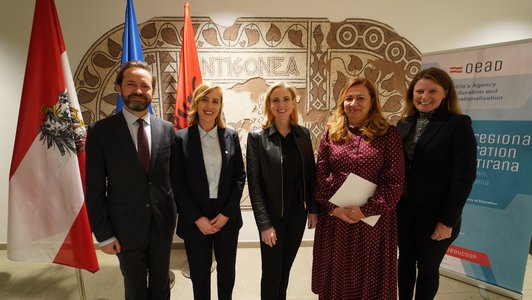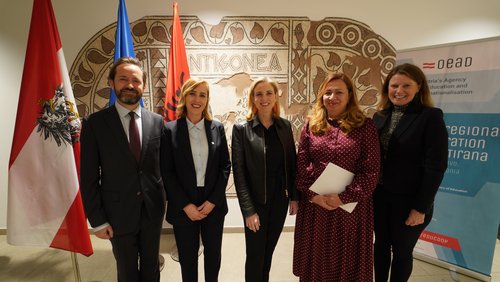30 years of educational cooperation between Austria and Albania
For many years Austria has been working with its partners to bring the Western Balkan countries closer to the European Union. This process is a key contribution to peacekeeping and stability in Europe and is particularly important for Austria due to its geographical proximity and historical ties to the region. Reforms in numerous policy areas are crucial to this. Education plays a key part in this, especially those sectors in which Austria is highly regarded internationally: vocational training.
The OeAD programme ‘Educational Cooperation with Eastern and South-Eastern Europe’ (Bildungskooperation mit Ost- und Südosteuropa, BIKO for short) was founded in 1994 on behalf of the Austrian Federal Ministry of Education (BMB) to strengthen dialogue and long-term partnerships in the field of education. Close cooperation with Albania has been in place since 1995; therefore 30 years of educational cooperation are now celebrated. For three decades the OeAD has been supporting strategic reforms in the Albanian vocational training system with educational coordinators seconded by the Ministry of Education and accompanying the development of modern, labour market-relevant offers.
On 25 November 2025 a ceremony was held in Tirana to mark the long-standing partnership. It was attended by the foreign minister Beate Meinl-Reisinger, the OeAD’s managing director Jakob Calice and the Albanian deputy ministers Orjana Osmani (Education) and Olta Manjani (Economy and Innovation).
30 years of educational cooperation between Austria and Albania
In the last few years numerous projects have been implemented in collaboration with Austrian experts. Around 40 institutions, 420 schools and approximately 20,000 participants benefited from more than 5,500 activities.
These collaborations have resulted in, for example:
- Practice companies and modern approaches to business education
- Tourism and hospitality training with new curricula, teaching materials and quality standards
- IT training based on the Austrian technical college model, including the establishment of the ICT School Tirana (since 2014) and the introduction of a new software engineering curriculum (2024–2025)
- Strengthening workplace learning and cooperation between schools and businesses
- Regional programmes on career guidance, quality assurance and inclusion
These initiatives are aligned with EU priorities and support the reform processes within the framework of Albania's EU accession. In addition to funding from the Ministry of Education large-scale projects have been and continue to be implemented with funding from other funding providers such as the Austrian Development Agency and the Municipality of Vienna.
For the Foreign Minister Beate Meinl-Reisinger one thing is certain: "Education is one of the strongest bridges we can build: it creates opportunities, strengthens economic development and connects young people across borders. Vocational training in particular shows how European integration works in everyday life – in a very practical way, with modern training methods, cooperation between schools and businesses, and a clear focus on future skills. A strong and united Europe begins here: with well-educated young people who see their future in Europe and want to help shape it.
The Education Minister Christoph Wiederkehr says: ‘Educational cooperation with Albania has been supporting the successful development of the Albanian education system for 30 years now, especially in vocational education and training. This is important for Albania's EU accession process and also strengthens economic relations. There is a particular focus on tourism and IT, areas in which Austria contributes its internationally recognised expertise.’
Current projects in Albania
The ongoing reform projects are embedded in key development priorities in Albania, at national and EU level.
- Digital education and increase in the number of IT specialists
- Work-based learning and strengthening of school-business partnerships
- Gender-sensitive school culture with annual Girls' Days
- Career and education guidance (within the regional project Get Ready 4 Job through Career Guidance, 2025-2027)
‘In the last few years the BIKO programme in Albania has increasingly focused on topics such as tourism and business education, cooperation between schools and industry, workplace learning, career guidance, digital education and sustainable school development. These are topics that are also central to Austria,’ emphasises the OeAD’s managing director Jakob Calice.
Added value for Austrian companies too
The OeAD programme ‘Educational Cooperation with Eastern and South-Eastern Europe’ not only strengthens Albania but also the Austrian economy. Many Austrian companies are active in Albania and benefit from well-trained skilled workers. A long-standing example is the cooperation with the Austrian Hotel Rogner in Tirana, which has been supporting work-based learning for pupils of the Tirana Tourism School for many years. It is a model that is typical of Austria's dual education system and is becoming increasingly established in Albania.
About the OeAD's BIKO programme
With its programme ‘Educational Cooperation with Eastern and South-Eastern Europe’ (BIKO) the OeAD has been accompanying systemic reforms, promoting reciprocity and strengthening international exchange since 1994. The programme brings Austrian expertise from schools and university colleges of teacher education to key future fields of education, from digitisation and setting measures to guarantee that there will be enough skilled workers to inclusion while at the same time increasing Austria's visibility and effectiveness in a strategically important region.
The programme ‘Educational Cooperation with Eastern and South-Eastern Europe’ (BIKO) is implemented by four OeAD cooperation offices, one each in Tirana (responsible for Albania, Kosovo, and North Macedonia), Sarajevo (responsible for Bosnia and Herzegovina, Montenegro, and Serbia), Chișinău (Moldova) and Uzhhorod (Ukraine). The office space is provided free of charge by local partner institutions. The educational coordinators, who are directly seconded by the Austrian Federal Ministry of Education (BMB), play a particularly important part. They head the OeAD cooperation offices, which are key interfaces in the implementation of customised projects. Project partners include the respective ministries responsible for pre-university education and training, education agencies, institutions for continuous professional development of teachers, regional education authorities, schools and other stakeholders in the partner countries and in Austria.


